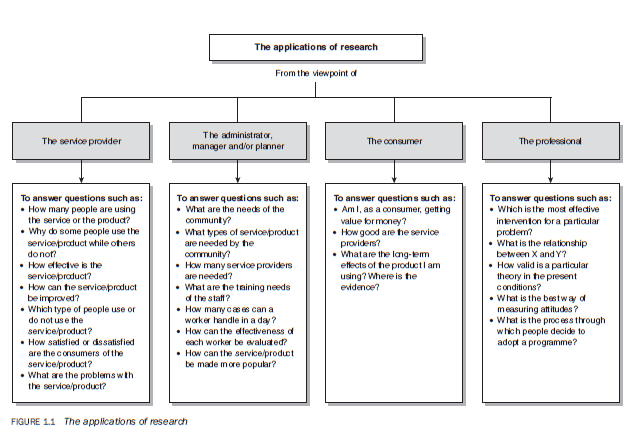There are several ways of obtaining answers to your professional questions. These methods range from the fairly informal, based upon clinical impressions, to the strictly scientific, adhering to the conventional expectations of scientific procedures. Research is one of the ways to find answers to your questions. When you say that you are undertaking a research study to find out answers to a question, you are implying that the process being applied:
- is being undertaken within a framework of a set of philosophies;
- uses procedures, methods and techniques that have been tested for their validity and reliability;
- is designed to be unbiased and objective.
Your philosophical orientation may stem from one of the several paradigms and approaches in research — positivist, interpretive, phenomenology, action or participatory, feminist, qualitative, quantitative — and the academic discipline in which you have been trained. The concept of ‘validity’ can be applied to any aspect of the research process. It ensures that in a research study correct procedures have been applied to find answers to a question. ‘Reliability’ refers to the quality of a measurement procedure that provides repeatability and accuracy. ‘Unbiased and objective’ means that you have taken each step in an unbiased manner and drawn each conclusion to the best of your ability and without introducing your own vested interest. The author makes a distinction between bias and subjectivity. Subjectivity is an integral part of your way of thinking that is ‘conditioned’ by your educational background, discipline, philosophy, experience and skills. For example, a psychologist may look at a piece of information differently from the way in which an anthropologist or a historian looks at it. Bias, on the other hand, is a deliberate attempt to either conceal or highlight something. Adherence to the three criteria mentioned above enables the process to be called ‘research’. Therefore, when you say you are undertaking a research study to find the answer to a question, this implies that the method(s) you are adopting fulfils these expectations (discussed later in the chapter).

However, the degree to which these criteria are expected to be fulfilled varies from discipline to discipline and so the meaning of ‘research’ differs from one academic discipline to another. For example, the expectations of the research process are markedly different between the physical and the social sciences. In the physical sciences a research endeavour is expected to be strictly controlled at each step, whereas in the social sciences rigid control cannot be enforced and sometimes is not even demanded.
Within the social sciences the level of control required also varies markedly from one discipline to another, as social scientists differ over the need for the research process to meet the above expectations. Despite these differences among disciplines, their broad approach to enquiry is similar. The research model, the basis of this book, is based upon this broad approach.
As beginners in research you should understand that research is not all technical, complex, statistics and computers. It can be a very simple activity designed to provide answers to very simple questions relating to day-to-day activities. On the other hand, research procedures can also be employed to formulate intricate theories or laws that govern our lives. The difference between research and non-research activity is, as mentioned, in the way we find answers to our research questions. For a process to be called research, it is important that it meets certain requirements and possesses certain characteristics. To identify these requirements and characteristics let us examine some definitions of research:
The word research is composed of two syllables, re and search.The dictionary defines the former as a prefix meaning again, anew or over again and the latter as a verb meaning to examine closely and carefully, to test and try, or to probe. Together they form a noun describing a careful, systematic, patient study and investigation in some field of knowledge, undertaken to establish facts or principles. (Grinnell 1993: 4)
Grinnell further adds: ‘research is a structured inquiry that utilises acceptable scientific methodology to solve problems and creates new knowledge that is generally applicable.’ (1993: 4) Lundberg (1942) draws a parallel between the social research process, which is considered scientific, and the process that we use in our daily lives. According to him:
Scientific methods consist of systematic observation, classification and interpretation of data. Now, obviously, this process is one in which nearly all people engage in the course of their daily lives. The main difference between our day-to-day generalisations and the conclusions usually recognised as scientific method lies in the degree of formality, rigorousness, verifiability and general validity of the latter. (Lundberg 1942: 5)
Burns (1997: 2) defines research as ‘a systematic investigation to find answers to a problem’.
According to Kerlinger (1986: 10), ‘scientific research is a systematic, controlled empirical and critical investigation of propositions about the presumed relationships about various phenomena’. Bulmer (1977: 5) states: ‘Nevertheless sociological research, as research, is primarily committed to establishing systematic, reliable and valid knowledge about the social world.’
Source: Kumar Ranjit (2012), Research methodology: a step-by-step guide for beginners, SAGE Publications Ltd; Third edition.

Excellent beat ! I would like to apprentice while you amend your web
site, how can i subscribe for a blog site? The account aided
me a acceptable deal. I had been a little
bit acquainted of this your broadcast provided bright clear concept